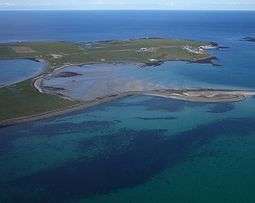Sons of the Most Holy Redeemer
|
The coat of arms of the F.SS.R. | |
| Abbreviation | F.SS.R. |
|---|---|
| Motto | Copiosa Apud Eum Redemptio, Alleluia! |
| Formation | August 2, 1988 |
| Type | Clerical Institute of Diocesan Right |
| Headquarters | Golgotha Monastery |
| Location | |
| Coordinates | 59°9′6.12″N 2°35′12.2″W / 59.1517000°N 2.586722°W |
Rector Major | Very Rev. Fr Michael Mary, F.SS.R. |
| Website | http://www.papastronsay.com/ |

The Congregation of the Sons of the Most Holy Redeemer (Latin: Filii Sanctissimi Redemptoris, Latin siglum: F.SS.R.), known as the Transalpine Redemptorists or The Sons, are a religious institute of the Catholic Church canonically erected in the Roman Catholic Diocese of Aberdeen and based on Papa Stronsay in the Orkney Islands, Scotland, as well as in the city of Christchurch, New Zealand. Their monastic rule is based on that of St. Alphonsus Liguori, although they have no formal connection to the Redemptorist religious institute.
History
The congregation was founded as The Transalpine Congregation of the Most Holy Redeemer (C.SS.R.) on 2 August 1988 by Father Michael Mary Sim C.SS.R. as a traditionalist Catholic Redemptorist religious community affiliated with Society of St. Pius X, and were called the Transalpine Redemptorists. On 3 December 1987 Archbishop Marcel Lefebvre officially blessed the undertaking of the foundation.
Originally based at the Monastery of the Sorrowful and Immaculate Heart of Mary on the Isle of Sheppey, Kent, they moved to the Mother of Perpetual Succour Monastery in Joinville, Haute-Marne, France in 1994 until they bought the island of Papa Stronsay on 31 May 1999.[1] There they established the Golgotha Monastery, and publish The Catholic, a monthly since 1982. They promote their own version of a Redemptorist Purgatorian Confraternity.[2]
In July 2007 the institute established a second monastery in the city of Christchurch, New Zealand.
In June 2008, the community petitioned the Holy See for reconciliation and this was accepted by Pope Benedict XVI who declared them to be in "canonical good standing" within the Catholic Church.[3] The motu proprio Summorum Pontificum was the main incentive which caused the community to reconsider their position.[4] Most of the members accepted the move, while a remnant continue to be affiliated with the SSPX. However, they were not "canonically erected" and thus their faculties for celebrating Mass were for some years restricted to the islands of Papa Stronsay and Stronsay.[5]
They changed their official name to The Sons of the Most Holy Redeemer (F.SS.R.), and made minor changes to their religious habit in order to more clearly differentiate it from that of the Redemptorist Congregation.[6]
On 15 August 2012, the community of fifteen was granted canonical recognition as a Clerical Institute of Diocesan Right by Dom Hugh Gilbert, O.S.B., Bishop of Aberdeen.[7] In June 2013, the congregation celebrated the ordination in Rome of two of its members.[8]
In 2001 Papa Stronsay had a population of 10[9] although by 2011 there were no "usual residents" living there as recorded by the census.[10] Nonetheless, Papa Stronsay continues to be the home and mother-house of the Sons of the Most Holy Redeemer, as their active online presence demonstrates.[11]
References
- ↑ "A brief history of the Sons of the Most Holy Redeemer"
- ↑ Purgatorian Archconfraternity
- ↑ Transalpine Redemptorists at home: Canonical Good Standing
- ↑ Greaves, Mark, "‘When we left, the stones came from behind’", Catholic Herald, 1 October 2010
- ↑ A Note from Rome
- ↑ Transalpine Redemptorists at home: No more servants, but sons. (Gal. IV:7)
- ↑ "Catholic Herald - Traditionalist group granted formal status within the Church after a four-year wait". Retrieved 20 August 2012.
- ↑ Aguirre, Estefania and Bunderson, Carl. "Group celebrates first ordinations since reunion with Rome", Catholic News Agency, June 29, 2013
- ↑ General Register Office for Scotland (28 November 2003) Scotland's Census 2001 – Occasional Paper No 10: Statistics for Inhabited Islands. Retrieved 26 February 2012.
- ↑ National Records of Scotland (15 August 2013) (pdf) Statistical Bulletin: 2011 Census: First Results on Population and Household Estimates for Scotland - Release 1C (Part Two). "Appendix 2: Population and households on Scotland’s inhabited islands". Retrieved 17 August 2013.
- ↑ Transalpine Redemptorists blog
External links
- Golgotha Monastery, Papa Stronsay, Orkney Scotland (official website)
- Transalpine Redemptorists at home (official blog)
- Friends of Papa Stronsay

